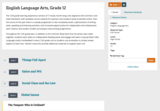
Read about Ahmose, first pharaoh of Egypt's New Kingdom, and find out why it was called the Golden Kingdom on this PBS site.
- Subject:
- Social Studies
- Material Type:
- Reading
- Provider:
- PBS
- Provider Set:
- Empires
- Date Added:
- 10/03/2023

Read about Ahmose, first pharaoh of Egypt's New Kingdom, and find out why it was called the Golden Kingdom on this PBS site.

This brief biography of Akenhaten (Akhenaten) fron PBS tells of his militant enforcement of monotheism in Egypt and the results of that.

Tuthmosis III showed his military acumen by expanding Egypt into an empire. Read about his exploits on the PBS site and watch the accompanying video. Requires RealPlayer.

The 12th grade learning experience consists of 7 mostly month-long units aligned to the Common Core State Standards, with available course material for teachers and students easily accessible online. Over the course of the year there is a steady progression in text complexity levels, sophistication of writing tasks, speaking and listening activities, and increased opportunities for independent and collaborative work. Rubrics and student models accompany many writing assignments.Throughout the 12th grade year, in addition to the Common Read texts that the whole class reads together, students each select an Independent Reading book and engage with peers in group Book Talks. Language study is embedded in every 12th grade unit as students use annotation to closely review aspects of each text. Teacher resources provide additional materials to support each unit.

The laws that govern and the social norms that regulate society are not always fair, legal, moral, or ethical. What is a person to do about all this injustice? What are the hazards of righting injustices or changing social norms? And what are the dangers of doing nothing?
ACCOMPLISHMENTS
Students read and annotate Antigone, “Letter from a Birmingham Jail,” and Pygmalion.
Students write a literary analysis showing the effect of social class or the law on a character’s life.
GUIDING QUESTIONS
These questions are a guide to stimulate thinking, discussion, and writing on the themes and ideas in the unit. For complete and thoughtful answers and for meaningful discussions, students must use evidence based on careful reading of the texts.
How do social class and legal institutions shape literary characters’ lives (and presumably our lives)?
How does social class affect a person in dealing with the law (protect a person, hurt a person)?
How is social class determined in America and in other places in the world?
BENCHMARK ASSESSMENT: Cold Read
During this unit, on a day of your choosing, we recommend you administer a Cold Read to assess students’ reading comprehension. For this assessment, students read a text they have never seen before and then respond to multiple-choice and constructed-response questions. The assessment is not included in this course materials.

In this lesson, students continue reading, annotating, and discussing Antigone. Students will learn more about the Oedipus myth and consider a different perspective on the story.